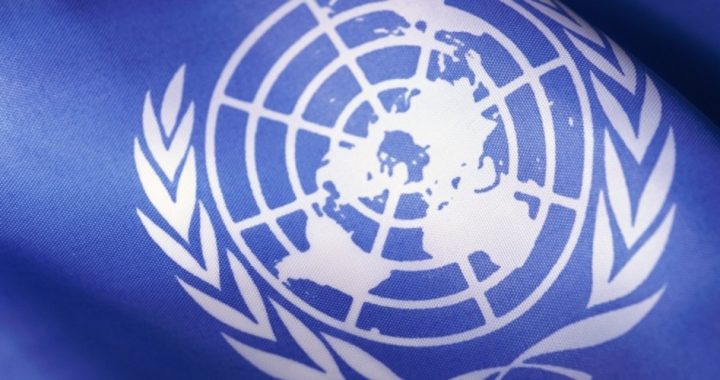
In 1954, a Gallup Poll reported that 55 percent of Americans believed the United Nations was doing a good job. Today, as we come to United Nations Day (October 24) 2018, the approval rating is only 34 percent.
When the UN was founded in 1945, however, in the aftermath of the Second World War, with the stated purpose of saving future generations from the scourge of war, suporting the UN was considered almost as patriotic as expressing pride in America. Over the years, the approval rating of the UN has gone up and down. The upswings have occurred when the American public has been deceived into thinking that the UN is somehow protecting us from a foreign threat. For example, approval reached 58 percent in 2002, when the UN Security Council adopted multiple resolutions condemning Saddam Hussein. It was at 54 percent after the first Persian Gulf War, when then-President George H.W. Bush said the UN was creating a “New World Order.”
Increasing its approval rating by going to war against one of its own member nations? Pretty strange for an organization supposedly created to save us from the “scourge of war.”
An 1975 editorial in the Arizona Republic discussed the popularity of the UN: “When the United Nations once was generally considered a respectable forum for maintaining some semblance of world harmony, the John Birch Society virtually was alone in its billboard demands to ‘Get US out of The UN.’ Time and events seem to prove the Birch Society may simply have been ahead of its time.”
The reason the Birch Society (parent organization for The New American) opposed the UN at a time when most of the American public viewed it as a patriotic organization is that it was aware of certain facts not readily available to the American public. After all, the media then was not all that different from the media today, specializing in withholding important information from the American people.
One thing the JBS understood from its own inception in 1958 is that the UN was a serious threat to America’s national sovereignty.
When the UN was founded, Article 2, Paragraph 7 of the UN Charter stated, “Nothing contained in the present Charter shall authorize the United Nations to intervene in matters which are essentially within the domestic jurisdiction of any state or shall require the Members to submit such matters to settlement under the present Charter.”
Despite these soothing words, the reality is that the UN was seen by its founders as the skeletal structure of a world government. This supposed restriction on the authority of the UN to interfere in a nation’s domestic affairs was, to paraphrase former Secretary of State William Jennings Bryan on another matter, simply an anesthetic so the removal of our national independence would be painless.
The year following the adoption of these words, William Carr, a consultant for the U.S. delegation at the San Francisco Conference which drew up the UN Charter, explained why this provision really did little to protect our national sovereignty. “Under modern conditions, few acts of a nation affect only its own people.… It seems clear that no nation which signs this Charter can justly maintain that any of its acts are its own business, or within its own domestic jurisdiction, if the Security Council says that these acts are a threat to peace.”
In other words, the provision guaranteeing national sovereignty is meaningless if the UN considers it meaningless.
And it is not just a nation, as a whole, that is expected to eventually bend the knee to the UN. One UN program, often dubbed Agenda 21, “proposes an array of actions which are intended to be implemented by every person on earth,” according to a top UN official, Robert Muller, in his book New Genesis: Shaping a Global Spirituality. He even asserted that the UN “is dealing with art, folklore, nature, the preservation of species, germ banks, labor, handicrafts, literature, industry, trade, tourism, energy, finance, birth defects, sickness, pollution, politics, the prevention of accidents, of war and conflicts, the building of peace, the eradication of armaments, atomic radiation, the settlement of disputes, the development of worldwide cooperation, the aspirations of East and West, North and South, black and white, rich and poor, etc.”
Etc. In a word, the UN supporters, like Muller, hope for the organization to control, well, everything — etc.
This desire to control every aspect of human society should not be all that surprising when one considers that the first acting UN secretary-general was an American citizen named Alger Hiss. Described at the time by Time magazine as “one of the State Department’s brightest young men,” Hiss was later exposed as a spy for the Soviet Union and was convicted of perjuring himself before a federal grand jury while being questioned about his Communist activities. He spent 44 months in a federal prison, and no doubt would have spent a longer time for his espionage activities on behalf of Soviet dictator Joseph Stalin had the statute of limitations not already expired.
The anniversary of the UN’s founding — October 24 — is certainly not a day to celebrate. Rather, it should be noted as a “day of shame.”



